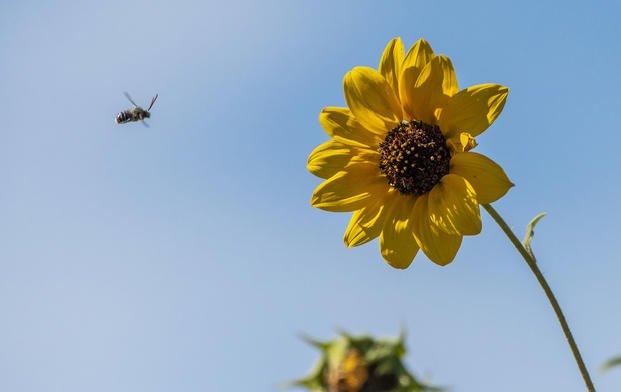Bloom where you're planted.
I used to like this phrase. I used to think it was inspirational and aspirational. It was a "you can do it" kind of phrase.
I don't see it that way anymore. Because it makes no sense.
Let me explain. This year, as I have in the past, I attempted to grow a vegetable garden and, as it has in the past, my garden yielded next to nothing. With the growing season now drawing to a close, I mentioned the sad state of the garden to my husband the other day.
"I wonder why nothing ever seems to grow?" I asked, rhetorically.
"I can tell you why if you really want to know," he responded. "Nothing grows because you don't garden."
He's right.
(Also, I already knew that.)
If I gardened -- the verb form of the word -- I would read up on growing zones, plant spacing and water and fertilizer requirements. I would understand which plants need full sun and which ones prefer partial. I would ask the county extension service to test my soil and then I would amend the soil with sulfur, pine needles, wood ash or lime.
But I don't do any of these things.
Instead, every year I spend about $75 on plants, plop them into the ground with no plan and little thought, and then I count on the rain and the sprinklers to take care of the watering.
Once every few weeks between April and October, I'll visit the garden looking for a tomato or a cucumber to harvest and maybe I'll spend a few minutes pulling some of the weeds that have taken root. Or maybe I won't.
In other words, I get only about three tomatoes and two cucumbers from my garden each year because I expect my plants to just "bloom where they're planted."
Imagine how much better they'd do if they had the right soil and the right conditions. Imagine how much they'd thrive if I took the time to train them on posts and pull the weeds that sprouted around them.
At least I don't blame them for the failure. At least I'm wise enough to understand that plants won't thrive just because I stuck them in some dirt.
Three years ago, I bought a Meyer Lemon tree for a planter on my porch. I've taken good care of it because I see it all the time and because my Florida climate is perfect for it.
The conditions are right, the plant is healthy and it has beautiful, fragrant flowers throughout the year, but this was the first year that it produced any fruit. After three years of watering it weekly and bringing it inside for the winter, the tree has yielded exactly one lemon, and that lemon was the size of a ping pong ball.
But that's the nature of most fruit trees, from what I understand. It takes years of careful attention before they start producing.
And it would be insane to blame them for that.
And yet that phrase "bloom where you're planted," a phrase that I now view as more abusive than aspirational, persists. In the military spouse world, we see it all the time. It's in the signature lines of emails from well-intentioned friends and on inspirational posters in government offices.
We torment ourselves with it. When our lives aren't "blooming," we assume that it's because we didn't simply make that happen by sheer force of will and determination.
But my tomato and cucumber plants are the most determined things you've ever seen. Left to fend for themselves, they've had to fight just to survive. They climb out from under each other and up the back wall of my house, struggling for sunlight. They develop massive root systems in order to find precious water. They fight off the wild, thorny, painful blackberry vines that are always trying to choke them out.
I think the same is true for many of us. The issue isn't that we don't want to and don't try to "bloom where we're planted," it's that it's almost impossible to thrive when you're simply struggling to survive.
My point in saying this is not to imply that we're doomed. We're not, not by a long shot. We all know people in our same situations who are, indeed, thriving.
But we do need to cut ourselves some slack. If we're not blooming, it may be because the conditions just aren't right -- yet. And when they are, we will grow that much taller, stronger and more productive because we already know how to get by with less than we needed.
Keep Up with the Ins and Outs of Military Life
For the latest military news and tips on military family benefits and more, subscribe to Military.com and have the information you need delivered directly to your inbox.





















